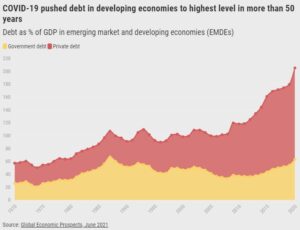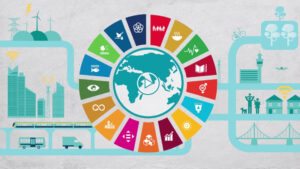The end of the year is traditionally a time reserved for reflection. A time where we can look back upon the events of the previous twelve months, and try to glean at least a bit of wisdom from those events with the benefit of hindsight. That’s how I remember this time of year being sold to us in the 20th century, anyway. Sold to us like corn flakes, and Chevrolet automobiles, and the enduring universal goodness of American patriotism. We were sold a lot of things in those days.
I imagine, at some point in the not too distant future, we might sit around camp fires regaling a generation yet-to-be-born with stories from the “golden age” of the late 20th century. We can tell them about freely riding our bicycles through the neighborhood without the fear of being snatched up by a predator, or stopped at a checkpoint. Or that time when we were in Freddie’s backyard down the street, relentlessly swatting locusts out of the air with badminton racquets. Whatever stories we imagine might fill these future children’s minds with wonder, because we know they now belong to an era long since gone.
It’s funny – as I try to recall some of these episodes from my own experiences, I find myself struggling to produce some of the details of those events. But I can still remember other details – like what the air smelled like that summer – very clearly. Sometimes a similar odor will even trigger memories of that time to spontaneously manifest. And maybe that’s how memory is supposed to work – for some of us anyway. Maybe it’s supposed to be bits and pieces that – by themselves – don’t really amount to much at all. But when you start to put them together, like the pieces of a sensory puzzle, the original image begins to come back into focus.
Looking In The Rearview

What events from 2021 stand out most prominently in your mind? And how accurate is that recall? Do you remember when the FDA approved the first round of experimental gene therapy booster shots? According to the Wall Street Journal, that happened in September. Or how about the massive cargo ship Ever Given getting stuck in the Suez Canal, blocking international shipping routes and snarling the “supply chains?” Do you remember when that happened?(Spoiler Alert: it was in March.) What about the GameStop short squeeze in the financial markets? Did that even happen in 2021?(It did.)
We can spend countless hours pouring over far too many poorly written articles trying to determine what the most important bits of information from the last year are – or, we could just let some faceless organization like the World Bank do the work for us. An article from their blog – everyone has one these days – purports to illustrate what our most important takeaways from the second year of the scam-demic should be. They even made sure to include lots of colorful charts and graphs for all the folks whose smooth brains are easily taxed by consuming too many words in one siting. If you haven’t already jumped into this scriptural cesspool head-first, then take a guess how the article begins? That’s right, there’s still not enough shots going into enough arms. After setting the stage with a brief preamble, the article proclaims:
“The quickest way to end the pandemic is by vaccinating the world. However, with just over 7 percent of people in low-income countries receiving a dose of the vaccines compared to over 75 percent in high-income countries, we need fair and broad access to effective and safe COVID-19 vaccines to save lives and strengthen global economic recovery.”
You are welcome to read the entire article, if you so choose. I make no judgements regarding your personal level of masochism. Though I would argue that your time would be better spent on most any other activity. The majority of the piece is spent outlining how the scam-demic fostered an exponential expansion of international debt, and further impoverished the already destitute bottom half of the world’s population. Because of course it is the alleged virus that is responsible for these circumstances – and not the governments, the monetary policies, or the people behind both who should bear that responsibility. Lather, rinse and repeat for a couple thousand words, and you’ve pretty much nailed the entire theme of the commentary.

The article concludes by shifting focus to – drum roll please – the ever-present specter of climate change, and the dire consequences that await us all if we continue our pattern of ignoring the big, green elephant in the room. Who didn’t see that one coming like a Peterbilt on a Kansas highway? But fear not, dear citizen – the World Bank assures us that they are on the case:
“The Bank Group is helping countries chart a recovery that is green, resilient, and inclusive through achieving economic stability and growth, leveraging the digital revolution, making development greener and more sustainable, and investing in people.”
Well, now – I suppose this means we can all sleep a little easier this New Year’s. Excuse me for a moment while I rush across the hall to the nearest toilet and empty the contents of my stomach into it. Be right back.
Catching Shades Of Futures Past
Alright, let me see if I’m getting this right… As a population, we are fed a constant stream of seemingly random bits of information to keep us confused and disoriented about the nature of what is actually taking place in the world around us. This is because we are supposed to believe that we are small, powerless, insignificant creatures at the mercy of forces we can never possibly hope to understand or even begin to control – like a tiny ship adrift on a sea of relentlessly rocking waves.
We are supposed to believe that the events we experience and witness on screens of all sizes – and to a larger extent, our accumulated history – are completely random happenings, and bear no relation whatsoever to each other. We are supposed to believe this, of course, until such time as it becomes necessary to shame and castigate us for a proposed outcome that we are told is so simple and so obvious that even an imbecile could have seen it coming. Is any of this starting to feel familiar yet? It reminds me of the last time I went to buy an automobile. Your results may vary.
In my own process of attempting to review the events of the last year, I found myself getting increasingly frustrated by what I was being told I should be paying attention to; because I recognized that most of it was garbage information from the start. This celebrity threw shade at that celebrity. This world leader – and I use the term loosely – was behaving badly. Death, destruction, mayhem and chaos were rampant all over the globe. All of these pieces – if you attempt to put them together – create a very disturbing image, indeed. It’s really no wonder people are beginning to lose their damn minds.
But while that may be where we are supposed to give up and stop searching, our story today does not end there. Just like back in May of 2010, when Scenarios for the Future of Technology and International Development was published by the Rockefeller Foundation, there are also people today who are casting their gaze forward in an effort to imagine what potential our future may hold. One such group attempting this prognostication is the Atlantic Council, who – I would imagine – are immediately recognizable to most of us already. If they are unfamiliar to you, I would definitely recommend spending some time to research the players involved in this organization. For the purposes of this exercise, you can think of them as an updated version of the Council on Foreign Relations or the Trilateral Commission.
2030 Is A Milestone Year
As part of their inaugural Global Foresight program, the Atlantic Council commissioned the production of an interactive “Choose Your Own Adventure”-style web article entitled Welcome to 2030: Three Versions of What the World Could Look Like in Ten Years. The authors of the article identify 10 key trends they believe will be intrinsic to forming the future that will emerge over the coming decade, and provide three potential scenarios for that future world they see being created by these trends. That doesn’t sound anything like what has become known as the “Lockstep document,” does it?

The dominant themes of this composition are – of course – the economic destabilization caused by the alleged virus, the “vaccine miracle”(their words, not mine), and the ever-increasing emphasis on the looming showdown between the United States and China/Russia on the world stage. Oh, and climate change; we can’t forget about that. They certainly won’t let us.
Similar to the Lockstep document, the scenarios presented in this article appear at first glance to reveal three different possible futures that may await us ten years down the road from the present moment. Whenever I feel the need to revisit the narratives laid out in that Rockefeller Foundation publication, what I actually end up finding are different aspects from each scenario reflected in our present reality. It’s not that any one prediction was wholly accurate; but each had it’s own elements that would become incorporated into our everyday world.
After combing through this publication from the Atlantic Council, I view the scenarios presented in Welcome to 2030 in much the same manner. Again, it’s not that one particular scenario is any more or any less valid than the others. Each one has vital elements that can easily be observed in our present reality, and it is not at all difficult to project these same elements ten years forward into the future. It may be most likely that these three scenarios will combine their various elements into the shape that the world of 2030 will take; very much like what happened in the last ten years with the four scenarios presented in the Lockstep document.
I would encourage everyone to take the time to read through at least the key points that each of the three scenarios lay out. The prefacing article composed of the ten key trends is very long and very dry, and I wouldn’t force that kind of torture on my worst enemies. Well… maybe on one or two of them – but there is a good chance they have perused it already. The point that I am attempting to make here is that the people in this world who control the strings of power will take this document very seriously. And while humor does help to cut the tension of our present situation, we should also take this document seriously and regard it as the resource it is no doubt meant to be.

And for those who enjoy doing this type of research, I would also encourage you to report the insights you discover while dissecting this article in the comments down below. After all, I have only one pair of eyes. And while I can often find things that others can’t, I am as subject to my own biases as the next person – which often causes me to miss what others may find obvious.
A Fork In The Road?
Or maybe your spare time and bandwidth over the next week or so could be better spent by pondering a different proposal: what kind of world do you want to be living in ten years from now? Do you intend to settle for a world somebody else wants to build for you to exist in? A world that may or may not provide you the freedom to live your own life as an individual? A world that views you as little more than an interchangeable part of a more important system; an input used to generate and manifest a pre-determined outcome?
To me – this time of year has always been about focusing our ability to make changes, plotting a new course for ourselves if necessary, and redirecting our energy into the activities and relationships that will create the world we want to live in. I mean – and I could be completely wrong here, but – I thought that is what Saturnalia is supposed to be all about. The cycle of death and rebirth; taking stock of the past and the present in order to provide the resources and direction necessary for building the future. But maybe that’s a subject we should save for a future post, as this one has already become far too long and meandering.
Wherever you happen to find yourself as the calendar flips over into 2022, take some time to reflect on the insanity we all shared and survived in the past 12 months. Grieve for those we have lost, if needed; whether they became separated from us physically, emotionally or spiritually. And know that now we have an opportunity before us to start building something different – something better – over the coming 12 months. We have the opportunity to lay a solid foundation for a better world for everyone; not just the 0.1% at the top of the pyramid. And if we can manage to attain that goal in the next 12 months, then there might not be a limit to what we can accomplish in 2023 and beyond.
